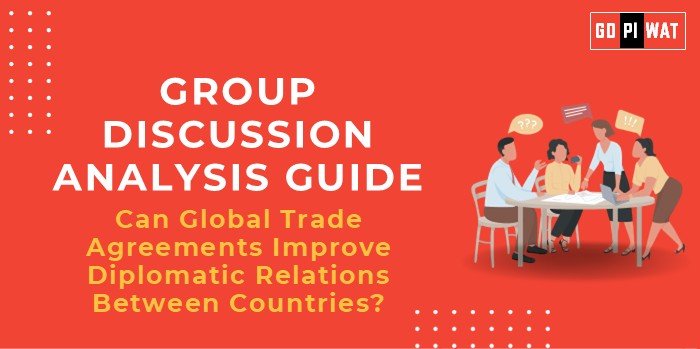📋 Group Discussion (GD) Analysis Guide
🌐 Topic: Can Global Trade Agreements Improve Diplomatic Relations Between Countries?
🌟 Introduction
Global trade agreements have played a pivotal role in shaping economic interdependence and fostering diplomatic ties. With the rise of multilateral agreements like RCEP and challenges in bilateral trade such as the US-China tensions, these frameworks remain central to global diplomacy.
📊 Quick Facts & Key Statistics
- 📈 Global Trade Volume: $24.9 trillion (2022) – Reflects the growing significance of international commerce since $6.45 trillion in 2000.
- 🌏 Countries in RCEP: 15 – Uniting the 10 ASEAN nations and five major Asia-Pacific economies, effective January 1, 2022.
- 🇺🇸 US-China Trade Deficit: $773 billion (2023) – Despite trade barriers, economic interdependence persists.
- 🇪🇺 EU-UK Trade Post-Brexit: Disruptions have highlighted regulatory challenges and strained economic relations, requiring continuous dialogue.
🧑🤝🧑 Stakeholders and Their Roles
- 🏛️ Governments: Shape agreements to align national economic goals with diplomacy.
- 🏢 Private Sector: Drive economic activities that leverage trade agreements for growth.
- 🌍 International Organizations: (e.g., WTO) Promote compliance and mediate disputes.
- 👥 Public: Experience direct impacts on employment, prices, and economic opportunities.
🏆 Achievements and Challenges
🎉 Achievements:
- 🌏 Economic Integration: RCEP, involving $25.8 trillion in combined GDP, connects some of the world’s largest economies.
- 🤝 Conflict Mitigation: USMCA’s resolution of NAFTA disputes shows agreements can reduce economic frictions.
- 📈 Market Expansion: EU-Japan Economic Partnership liberalized over 90% of trade.
- 🌐 Boost to Regional Cooperation: ASEAN’s trade agreements unify diverse economies.
⚠️ Challenges:
- 📉 Trade Imbalances: US-China deficit illustrates persistent disparities.
- 🏛️ Political Interference: Brexit exemplifies the economic fallout from geopolitical decisions.
- 🔍 Implementation Gaps: Developing nations struggle to fully leverage agreements.
🌍 Global Comparisons:
- 🇪🇺 EU vs. RCEP: While the EU incorporates political unity, RCEP emphasizes pure economic integration.
- 🇨🇳 China’s BRI: Blends trade and infrastructure, impacting global diplomatic ties.
🗣️ Effective Discussion Approaches
📌 Opening Approaches:
- 🌐 “Global trade reached $24.9 trillion in 2022, showcasing the vast interconnection fostered by agreements like RCEP.”
- 📉 “The US-China trade deficit, now $773 billion, underscores both the dependency and tensions trade agreements seek to navigate.”
🎭 Counter-Argument Handling:
- “While trade creates dependencies, aligning political frameworks is crucial to mitigate risks of conflict.”
🔍 Strategic Analysis of Strengths & Weaknesses
- ✅ Strengths:
- Enhanced market access.
- Reduction in tariffs.
- Facilitation of global cooperation.
- ❌ Weaknesses:
- Imbalanced benefits.
- Trade barriers due to political disputes.
- 📈 Opportunities:
- Integration of digital trade.
- Sustainability-driven agreements.
- ⚠️ Threats:
- Rising protectionism.
- Regulatory misalignments.
📖 Structured Arguments for Discussion
- ✅ Supporting Stance: “Trade agreements create interdependencies that reduce conflict potential.”
- ❌ Opposing Stance: “Economic ties may exacerbate inequalities and fuel geopolitical tensions.”
- ⚖️ Balanced Perspective: “Agreements foster cooperation but need comprehensive frameworks to balance power dynamics.”
🎓 Connecting with B-School Applications
- 📘 Real-World Applications:
- Strategic supply chain management.
- Trade-finance projects.
- 📋 Sample Interview Questions:
- “How can trade agreements address global inequalities?”
- “What lessons do Brexit negotiations provide for future agreements?”
- 💡 Insights for Students:
- Research opportunities in trade sustainability.
- Geopolitical risk assessments.


